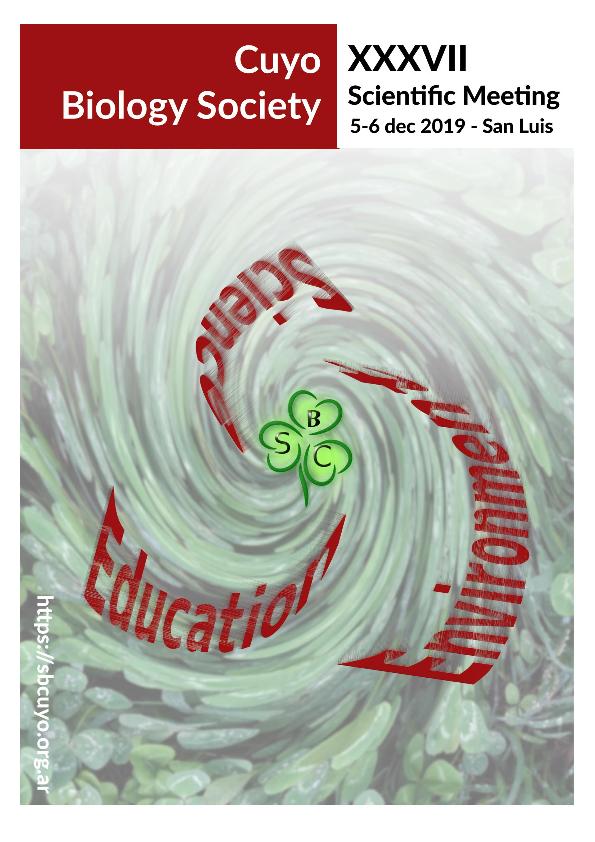Evento
Long-term effects od neonatal hypoxia on anxiety-related behaviors and hormonal response to acute stress
Neira, Flavia Judith ; Torrecilla, Norma Mariana
; Torrecilla, Norma Mariana ; Pennacchio, Gisela Erika
; Pennacchio, Gisela Erika ; Soaje, Marta
; Soaje, Marta ; Jahn, Graciela Alma
; Jahn, Graciela Alma ; Seltzer, Alicia Mabel
; Seltzer, Alicia Mabel ; Valdez, Susana Ruth
; Valdez, Susana Ruth
 ; Torrecilla, Norma Mariana
; Torrecilla, Norma Mariana ; Pennacchio, Gisela Erika
; Pennacchio, Gisela Erika ; Soaje, Marta
; Soaje, Marta ; Jahn, Graciela Alma
; Jahn, Graciela Alma ; Seltzer, Alicia Mabel
; Seltzer, Alicia Mabel ; Valdez, Susana Ruth
; Valdez, Susana Ruth
Tipo del evento:
Reunión
Nombre del evento:
XXXVII Reunión Científica Anual de la Sociedad de Biología de Cuyo
Fecha del evento:
05/12/2019
Institución Organizadora:
Sociedad de Biología de Cuyo;
Título de la revista:
Biocell
Editorial:
Tech Science Press
ISSN:
0327-9545
Idioma:
Inglés
Clasificación temática:
Resumen
Neonatal lesions in the brain have less severe effects than in adults due to the neuronal plasticity of the developing nervous system, although they can cause cognitive and behavioral sequelae. Previously, we found that neonatal hypoxia (NH) transiently affected the expression of proteins associated with synaptogenesis in certain brain areas. The intermingled neural circuits controlling both stress and anxiety suggest a strong relationship between stress experiences and anxiety in both healthy and pathological conditions. We evaluated the long-term effects of NH on anxiety parameters and in stress-induced hormone release in adult female (estrous day of rat cycle) and male rats. Sprague Dawley rats at 4 Post-Natal Day (PND) were exposed to an atmosphere of low oxygen level (6.5% O2 and 93.5% N2) for 70 min. 4PND control pups were exposed to normal oxygen levels (Co) for 70 min. The humidity and temperature conditions were controlled. Pups were then returned with their mother until weaned, and then they were allowed to grow. At 3 months of age, both groups of rats were subjected to two tests, Elevated Plus Maze (EPM) to measure anxiety parameters and a stressful challenge to determine hormone response to acute stress (exposure to ether vapors for 2 min). EPM reflected an unconditional aversion to heights and open spaces, an anxiogenic behavior. The hormonal response to stress included the release of pituitary prolactin (PRL), adrenal progesterone (P4), and adrenal corticosterone (CORT). Blood samples were collected before and after 5 min of stress exposure for serum hormone determinations by RIA. In the EPM test, both female and male hypoxic rats increased the number of entries to the open arms (OA) and the time spent in the OA compared to Co (P<0.05). The results obtained indicated an anxiolytic-related behavior induced by NH, that was higher in female than in male hypoxic rats. Basal levels (unstressed) of PRL and P4 in NH rats remained similar to Co ones in both sexes. Only in female rats, NH increased the basal levels of CORT compared Co rats (P<0.05). In female and male rats, the hormonal release of PRL, P4, and CORT induced by stress, were differentially affected by NH. Hypoxia attenuated the stress-induced PRL secretion in female rats (P<0.05) while this response was blocked in males. The release of CORT by stress was blunted in both sexes by NH. The release of P4 by stress was inhibited in NH female but it was preserved in male rats. In conclusion, the long-term effects of NH were influenced by sex. NH altered the anxiety levels and the hormonal response to stress in adulthood. The alterations caused by NH at the brain level could be influencing the appropriate response to situations of stress and anxiety in adulthood.
Palabras clave:
NEONATAL-HYPOXIA
,
ANXIETY
,
STRESS-RESPONSE
,
EFFECTS
Archivos asociados
Licencia
Identificadores
Colecciones
Eventos(IMBECU)
Eventos de INST. DE MEDICINA Y BIO. EXP. DE CUYO
Eventos de INST. DE MEDICINA Y BIO. EXP. DE CUYO
Citación
Long-term effects od neonatal hypoxia on anxiety-related behaviors and hormonal response to acute stress; XXXVII Reunión Científica Anual de la Sociedad de Biología de Cuyo; San Luis; Argentina; 2019; 24-24
Compartir



